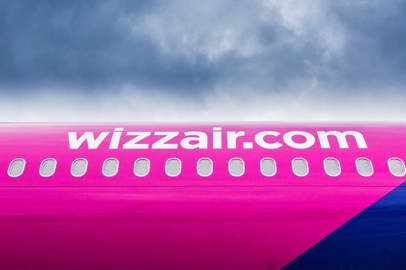13 March 2024
Heathrow launches renewable biofuel breakfast
Heathrow partners with Heston Blumenthal’s Perfectionists’ Cafe to create "The Fly Up", a Biofuel breakfast launched to increase understanding of Sustainable Aviation Fuel (SAF)
A first of its kind breakfast at Heathrow, named The Fly Up, which is cooked with oil that is then cleaned and recycled into renewable biofuels, has taken off. The Heathrow Fly Up has been created in partnership with chef Heston Blumenthal to create awareness of Sustainable Aviation Fuel (SAF) in response to only 14 per cent of travellers having heard of it, despite the fact it will play a key role in reducing the carbon footprint of the aviation industry. In the UK aviation sector’s latest net zero roadmap, SAF is the single biggest innovation that will help it hit its Net Zero target by 2050.
 The Fly Up, Heathrow Airport. Copyright © Heathrow Airport Press
The Fly Up, Heathrow Airport. Copyright © Heathrow Airport PressHeathrow is committed to decarbonising, and biofuels have a key role to play in its Net Zero plan. On the ground, Heathrow has made the switch to HVO biodiesel with over 95 per cent of its operational diesel fleet now run on the fuel. It is a global airport leader on SAF – setting a goal for 11 per cent of the jet fuel used at Heathrow to be SAF by 2030. Heathrow’s pioneering Sustainable Aviation Fuel scheme incentivises the use of SAF at the airport, approximately halving the price gap between conventional jet fuel and SAF, making it more affordable to airlines. Thanks, in part to this scheme, approximately 10 per cent of the world’s SAF was used at Heathrow in 2022.

The Fly Up, Heathrow Airport. Copyright © Heathrow Airport Press
The scheme aims to target 2.5% of all fuel used at Heathrow to be SAF in 2024. If achieved, this will amount to up to 155,000 tonnes of fuel. It is a key part of Heathrow’s ongoing efforts to protect the benefits of aviation while building a more sustainable future for the industry.
To help reach Net Zero by 2050, the airport’s shorter term goal is to cut carbon from the air by up to 15 per cent, and on the ground at the airport by at least 45 per cent, by the end of this decade. These goals have been validated by the Science Based Targets initiative as consistent with a 1.5 degree carbon reduction trajectory – Heathrow was the first airport to achieve this validated status with the updated 1.5 degrees standard.

The Fly Up, Heathrow Airport. Copyright © Heathrow Airport Press
SAF is a fuel with a significantly smaller carbon footprint compared to traditional jet fuel and is made from a variety of sources, including used cooking oils. It can be used in aircraft engines alongside regular fuel and the UK aviation sector projects that it will account for around 40 per cent of the aviation industry’s total carbon reductions by 2050.
Heathrow works with waste management service Quatra to collect, clean and recycle the used cooking oils from the Fly Up breakfast. Following collection, the cooking oils and fats undergo treatment and purification to remove organic impurities and water. The processed used oil is then forwarded to Quatra’s partners and transformed into biofuels including Sustainable Aviation Fuel (SAF) and Hydrotreated Vegetable Oil (HVO).
The launch of the Fly Up comes as new research reveals only one quarter (27 per cent) of the UK believe SAF will make the aviation industry more sustainable. Heathrow is actively encouraging passengers to join its efforts in addressing aviation’s carbon emissions by using climate tech company, CHOOOSE. The platform gives passengers the option to support SAF or certified reforestation projects regardless of their airline or end destination.

The Fly Up, Heathrow Airport. Copyright © Heathrow Airport Press
The aim is that this will become more commonplace as people learn about the benefits of SAF. Currently 63 per cent would choose to travel more sustainably if they could, yet nine in 10 flyers are unaware of the purpose of SAF – one of the most important factors in reducing the carbon footprint of the aviation industry.
The net zero transition for aviation is happening. Heathrow has a clear plan and is working hard to deliver against our ambitious 2030 carbon reduction goals. United was one of the participating airlines in Heathrow’s SAF incentive programme, having received a blend of SAF and conventional jet fuel at the airport in 2023. In November last year, Heathrow celebrated the first ever transatlantic 100% SAF flight flown by a commercial airline, Virgin Atlantic. Its financial incentive to airlines to use SAF more is targeting the equivalent of over 340,000 tonnes of carbon cut from flights. £71m is available to airlines to support the swap to cleaner fuels. More info: www.heathrow.com/SAF
Heathrow
Heathrow is the UK’s international gateway, the largest airport in Europe and the most connected megahub in the world - connecting to 239 destinations in 89 countries. The airport welcomes over 200,000 passengers on roughly 1,300 flights each day, and serves as a Britain’s hub for trade, tourism and investment. Approximately 75,000 people work at Heathrow - the airport directly employs about 10% of them, with the rest working for Team Heathrow partners including airlines, ground handlers and retailers.
Edited by editorial staff, Avion Tourism Magazine
Text source and photos: Copyright © Heathrow Press
You might be interested in
Sustainability

Sustainable Mobility
Dubai Airports achieves ACI Level 4 accreditation
DXB among the few airports in the world awarded for the absolute reduction of emissions and for the ability to drive environmental change
Sustainability

Sustainable Mobility
Wizz Air's Net Zero Strategy
The company launches its "Flying Towards Net Zero" strategy, which focuses on sustainable aviation fuel (SAF) as a key lever for decarbonization
Sustainability

Sustainable Mobility
Volotea with TotalEnergies for sustainable fuel
An agreement for the supply of sustainable aviation fuel (SAF) for use on flights departing from French airports


